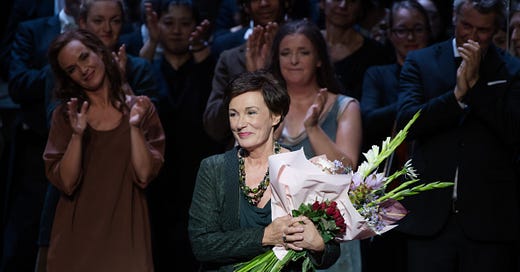Meier's Klytämnestra bows out in Berlin
The great German mezzo's farewell to the stage, plus Il trittico at the Deutsche Opera, Parsifal in Hanover
Waltraud Meier acknowledging applause at her farewell to the stage on October 20 at Berlin’s Staatsoper Unter den Linden Picture by Jakob Tillman
On my latest visit to Berlin to see a new staging of Puccini’s Trittico at the Deutsche Oper, I extended my stay at short notice to include Strauss’s Elektra at the Staatsoper, in a production I had first seen at Aix-en-Provence 10 years ago. The singer of Klytämnestra on both occasions was the renowned German diva Waltraud Meier - the difference being that I was now witnessing the first performance (October 7) of her farewell run as Klytämnestra on stage.
Meier’s career as one of the most charismatic singing actors of our time began in her native city of Würzburg 47 years ago, when she sang Lola, aged only 20, in Cavalleria rusticana. She was quickly engaged at Mannheim, and later Dortmund and Stuttgart (1978-88), learning her trade in the German ensemble system before launching herself on a freelance, then meteoric international career.
It was in Stuttgart that she caught the eye and ear of Wolfgang Wagner, who asked her to cover Leonie Rysanek as Kundry in Götz Friederich’s celebrated 1982 Bayreuth production of Parsifal. Rysanek was experiencing vocal problems and cancelled the 1983 revival. Meier’s Kundry duly created a sensation: she became an overnight star at the age of 27, and for the next 32 years was acclaimed as the Kundry of the day.
I heard her sing the role six times, starting with her Royal Opera debut in 1988, followed by Bayreuth (1989), La Scala, Milan (1991), the Châtelet in Paris (1997), and twice in Berlin (2009, 2016) in different productions conducted by Daniel Barenboim. With her high, soprano-ish mezzo and ideal physique du rôle, it’s hard to think of anyone who has left a more indelible imprint on Wagner’s most problematic female character: no one in my experience has made the transition from the haggard hysteric (Act 1) to spellbinding seductress (Act 2) to mute penitent (Act 3) more completely or more compellingly.
Keep reading with a 7-day free trial
Subscribe to Operalogue to keep reading this post and get 7 days of free access to the full post archives.




